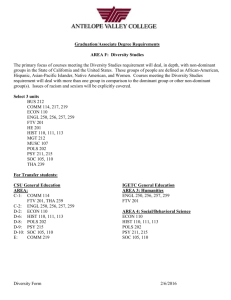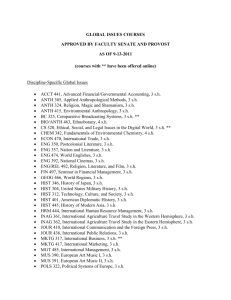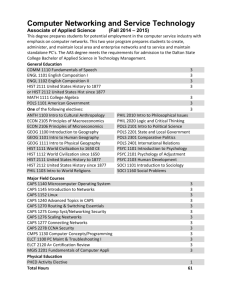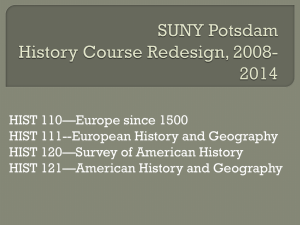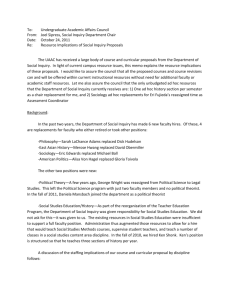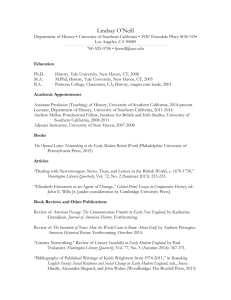SSHT Revision - Winona State University
advertisement
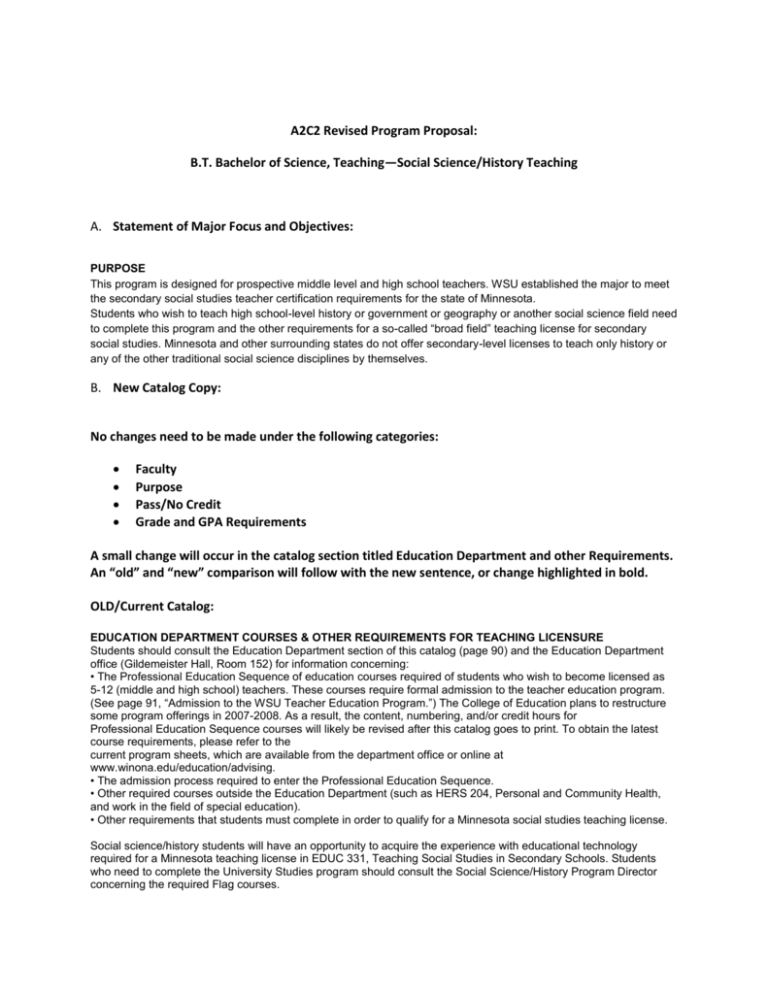
A2C2 Revised Program Proposal: B.T. Bachelor of Science, Teaching—Social Science/History Teaching A. Statement of Major Focus and Objectives: PURPOSE This program is designed for prospective middle level and high school teachers. WSU established the major to meet the secondary social studies teacher certification requirements for the state of Minnesota. Students who wish to teach high school-level history or government or geography or another social science field need to complete this program and the other requirements for a so-called “broad field” teaching license for secondary social studies. Minnesota and other surrounding states do not offer secondary-level licenses to teach only history or any of the other traditional social science disciplines by themselves. B. New Catalog Copy: No changes need to be made under the following categories: Faculty Purpose Pass/No Credit Grade and GPA Requirements A small change will occur in the catalog section titled Education Department and other Requirements. An “old” and “new” comparison will follow with the new sentence, or change highlighted in bold. OLD/Current Catalog: EDUCATION DEPARTMENT COURSES & OTHER REQUIREMENTS FOR TEACHING LICENSURE Students should consult the Education Department section of this catalog (page 90) and the Education Department office (Gildemeister Hall, Room 152) for information concerning: • The Professional Education Sequence of education courses required of students who wish to become licensed as 5-12 (middle and high school) teachers. These courses require formal admission to the teacher education program. (See page 91, “Admission to the WSU Teacher Education Program.”) The College of Education plans to restructure some program offerings in 2007-2008. As a result, the content, numbering, and/or credit hours for Professional Education Sequence courses will likely be revised after this catalog goes to print. To obtain the latest course requirements, please refer to the current program sheets, which are available from the department office or online at www.winona.edu/education/advising. • The admission process required to enter the Professional Education Sequence. • Other required courses outside the Education Department (such as HERS 204, Personal and Community Health, and work in the field of special education). • Other requirements that students must complete in order to qualify for a Minnesota social studies teaching license. Social science/history students will have an opportunity to acquire the experience with educational technology required for a Minnesota teaching license in EDUC 331, Teaching Social Studies in Secondary Schools. Students who need to complete the University Studies program should consult the Social Science/History Program Director concerning the required Flag courses. Proposed New: EDUCATION DEPARTMENT COURSES & OTHER REQUIREMENTS FOR TEACHING LICENSURE Students should consult the Education Department section of this catalog (page 90) and the Education Department office (Gildemeister Hall, Room 152) for information concerning: • The Professional Education Sequence of education courses required of students who wish to become licensed as 5-12 (middle and high school) teachers. These courses require formal admission to the teacher education program. (See page 91, “Admission to the WSU Teacher Education Program.”) Students are required to complete the professional education sequence with the exception of EDUC 429 Secondary Reading and Teaching Strategies, which is not required, though students may still benefit from the class. The College of Education plans to restructure some program offerings in 2007-2008. As a result, the content, numbering, and/or credit hours for Professional Education Sequence courses will likely be revised after this catalog goes to print. To obtain the latest course requirements, please refer to the current program sheets, which are available from the department office or online at www.winona.edu/education/advising. • The admission process required to enter the Professional Education Sequence. • Other required courses outside the Education Department (such as HERS 204, Personal and Community Health, and work in the field of special education). • Other requirements that students must complete in order to qualify for a Minnesota social studies teaching license. Social science/history students will have an opportunity to acquire the experience with educational technology required for a Minnesota teaching license in EDUC 331, Teaching Social Studies in Secondary Schools. Students who need to complete the University Studies program should consult the Social Science/History Program Director concerning the required Flag courses. REQUIRED COURSES ( s.h.) Economics (6 S.H.) *ECON 201 Principles of Microeconomics (3) ECON 202 Principles of Macroeconomics (3) Geography (9 S.H.) GEOG 211 Economic Geography (3) GEOG 212 Physical Geography (3) GEOG 213 Cultural Geography (3) History (12 S.H.) Two of the following: HIST 150 U.S. History to 1865 (3) HIST 151 U.S. History Since 1865 (3) HIST 214 The Mississippi River in U.S. History (3) And Select Two of the Following: *HIST 120 Western Civilization to 1500 (3) *HIST 121 Western Civilization, 1500-1815 (3) *HIST 122 Western Civilization, 1815-Present (3) Political Science (9 S.H.) *POLS 120 Introduction to American Politics (3) +POLS 228 Public Service (3) Select One of the Following: POLS 130 International Relations (3) POLS135 Comparative Politics (3) POLS 150 Introduction to Political Theory (3) POLS 315 American Political Thought (3) POLS 321 American Presidency (3) POLS 322 Political Parties and Pressure Groups (3) POLS 330 Race and American Politics (3) POLS 360 American Congress (3) Research Methods (3 S.H.) +HIST 298 Historical Methods (3) Sociology (3 S.H.) Introduction to Sociology (3) Social Science/History Teaching Methods (6 S.H.) EDUC 331 Teaching Social Studies in Secondary Schools (3) HIST 431 Social Science/History Teaching Capstone (3 ) Electives (15 S.H.) Students complete a concentration of 15 semester hours at the 300—or 400—level in one of the following disciplines: economics, geography, history, political science, sociology, or psychology. The course selections are subject to the director’s approval. PROFESSIONAL EDUCATION SEQUENCE (28 s.h.) EFRT 305 Human Development and Learning (4) +EFRT 308 Human Relations and Student Diversity (3) EFRT 312 Instructional Planning and Assessment (3) EFRT 449 Middle School Philosophy and Organization (3) EFRT 459 Professional Educator (3) EDUC 465 Student Teaching (12) ADDITIONAL LICENSURE COURSES (9 s.h.) SPED 400 Education of Exceptional Children/Youth (3 S.H.) HERS 204 Personal and Community Health (3 S.H.) BIOL 104 Environment, Society, and Conservation (3 S.H.) *Course may be used to satisfy Humanities or Social Science requirements in University Studies. +Course may be used to satisfy certain Unity and Diversity requirements in the University Studies Program. Part C: Provide and easy side-by-side comparison of proposed changes. B.S. MAJOR - SOCIAL SCIENCE/HISTORY (Secondary Social Studies Teaching) (SSHT) 81-83 S.H. (No Minor Required) B.T. Major—Social Science/History (Secondary Social Studies Teaching) (SSHT) 100 S.H. (No Minor Required) *Despite courses dropped, the number on the right (100) reflects a higher number than the 81-83 because it represents all of the required courses in the major, including the following categories: REQUIRED COURSES, ELECTIVES, PROFESSIONAL SEQUENCE, LICENSE REQUIREMENTS. This is an opportunity to be more thorough than the current catalog listing. REQUIRED COURSES (66-68 S.H.) REQUIRED COURSES (48 S.H.) Anthropology (3 S.H.) SOC 340 Social-Cultural Anthropology (3) Requested not to have Anthropology category and class out of program Economics (6 S.H.) * ECON 201 Principles of Microeconomics (3) * ECON 202 Principles of Macroeconomics (3) Economics (6 S.H.) ECON 201 Principles of Microeconomics (3) ECON 202 Principles of Macroeconomics (3) Geography (12 S.H.) * GEOG 110 World Regional Geography (3) GEOG 211 Economic Geography (3) * GEOG 212 Physical Geography (3) * GEOG 213 Cultural Geography (3) Geography (9 S.H.) out of program GEOG 211 Economic Geography (3) GEOG 212 Physical Geography (3) GEOG 213 Cultural Geography (3) History (12 S.H.) Two of the following: * HIST 150 U.S. History to 1865 (3) * HIST 151 U.S. History Since 1865 (3) * HIST 214 The Mississippi River in U.S. History AND select two of the following: * HIST 120 Western Civilization to 1500 (3) * HIST 121 Western Civilization, 1500-1815 (3) * HIST 122 Western Civilization, 1815-Present (3) History (12 S.H.) Two of the following: HIST 150 U.S. History to 1865 (3) HIST 151 U.S. History Since 1865 (3) HIST 214 The Mississippi River in U.S. History (3) AND select two of the following: HIST 120 Western Civilization to 1500 (3) HIST 121 Western Civilization, 1500-1815 (3) HIST 122 Western Civilization, 1815-Present (3) Political Science (9 S.H.) * POLS 120 Introduction to American Politics (3) * POLS 228 Public Service (3) Political Science (9 S.H.) POLS 120 Introduction to American Politics (3) POLS 228 Public Service (3) And one of the following: POLS130 International Relations (3) POLS 135 Comparative Politics (3) POLS 150 introduction to Political Theory (3) POLS 130 International Relations (3) POLS 135 Comparative Politics (3) POLS 150 Introduction to Political Theory (3) POLS 315 American Political Thought (3) POLS 332 American Presidency (3) POLS 322 Political Parties and Pressure Groups (3) POLS 330 Race and American Politics (3) Psychology (3 S.H.) * PSY 210 Introduction to Psychological Science (3) out of program, many will probably take for other state license requirements or as non-major elective. Sociology (3 S.H.) * SOC 150 Introduction to Sociology (3) Sociology (3 S.H.) SOC 150 Introduction to Sociology (3) Social Psychology (3 S.H.) One of the following: * SOC 205 Social Interaction (3) OR * PSY 325 Social Psychology (3) out of program Research Methods (6-8 S.H.) Research Methods (3 S.H.) † HIST 298 Historical Methods and Historiography (3) HIST 298 Historical Methods and Historiography (3) AND select one of the following: POLS 380 Political Research I - Secondary (3) OR out of program SOC 376 Introduction to Social Research (3) OR † PSY 308 Experimental Psychology (3); PSY 309 Experimental Psychology Lab (2) Global Perspectives (3 S.H.) Replaced by EFRT 308 (found in ed. Sequence) Note: Students in the program will complete the University Studies global or multicultural perspectives requirements by taking one of the following courses: HIST 123 East Asian Civilization (3) HIST 165 Latin American History (3) HIST 170 African Civilization (3) Education (3 S.H.) Social Science/History Teaching Methods (6 S.H.) EDUC 331 Teaching Social Studies in Secondary Schools (3) EDUC 331 Teaching Social Studies in Secondary Schools Capstone (3 S.H.) HIST 431 Social Science/History Teaching Capstone ELECTIVES (18 S.H.) Students complete a concentration of 18 semester hours at the 300-or 400level in one of the following disciplines: Economics, geography, history, political science, psychology, or Sociology. ELECTIVES (15 S.H.) Students complete a concentration of 15 semester hours at the 300- or 400level in one of the following disciplines: Economics, geography, history, political science, psychology, or sociology. PROFESSIONAL EDUCATION SEQUENCE (39 S.H.) PROFESSIONAL EDUCATION SEQUENCE (28 S.H.) EFRT 304 Human Development and Learning: Middle Level and K-12 (4) OR EFRT 305 Human Development and Learning: Secondary (4) EFRT 304 Human Development and learning: Middle Level and K-12 (4) OR EFRT 305 Human Development and Learning: Secondary (4) EFRT 308 Human Relations and Student Diversity (3) EFRT 308 Human Relations and Student Diversity (3) EFRT 311 Instructional Planning and Assessment: EFRT 311 Instructional Planning and Assessment: Middle Level and K-12 (3) OR Middle Level and K-12 (3) OR EFRT 312 Instructional Planning and Assessment: EFRT 312 instructional Planning and Assessment: Secondary (3) Secondary EDUC 429 Secondary Reading and Teaching Strategies (4) EFRT 449 Middle Level Philosophy, Organization and Interdisciplinary Planning (3) Out of program EFRT 449 Middle Level Philosophy, Organization and Interdisciplinary Planning (3) EFRT 459 The Professional Educator (3) EFRT 459 The Professional Educator (3) SPED 400 Education of Exceptional Children/ Youth Moved to category “Additional Licensure Courses” EDST 465 Student Teaching – Senior High School (12 - 16) EDUC 465 Student Teaching Senior High (12) ADDITIONAL LICENSURE COURSES (S.H.): ADDITIONAL LICENSURE COURSES (6 S.H.): *This category is not represented in the current catalog. The column on the right reflects licensure courses in the major. SPED 400 Education of Exceptional Children/ Youth (3) HERS 204 Personal and Community Health (3) BIOL 104 Environment, Society, and Conservation (3) A brief follow-up narrative of C1/C2 Narrative description of C1 and C2 C1 and C2 of the curricular change checklist asks for a brief narrative of changes. As noted above, changes in this program are proposed as result of a 120 hour mandate from the Minnesota legislature. At the same time, SSHT students must take a national exam (assessment) for licensure. Likewise, SSHT program majors must document evidence of learning outcomes in the ten National Council of Social Sciences knowledge standards. Moreover, the state of Minnesota Board of Teaching requires the program to cover over 120 sub standards. Taking all of these factors into consideration, the following will be cut out of the program: one history course, one psychology course, one political science course, one sociology course, one geography course, and one education course. In addition, the second methods course will be eliminated and the program requests student teaching to count for 12 hours in the 12-16 hour sliding scale (=cut of 23 hours). These changes, along with better use of the university studies, will reduce the program to 119 hours. Technically, there are no “new” courses in the program. However, the side-by-side list will note that the category of electives reduced from 18 hours to 15 hours. One of the courses students have been taking as an upper division elective, HIST 431, was moved to the new sub-category of “Social Science/History Teaching Methods.” Previous this was a vaguely labeled sub-category called “Education.” It was also recommended that the catalog include the education sequence classes and additional license classes in one place in the catalog so students can see the entire program. It was probably cross-listed before due to space saving measures. C3b Section C3b asks for a catalog description of each of the required courses. This list will be long and you may reference as needed. I will highlight the only semi-new class, HIST 431, in bold. 201 – Principles of Microeconomics (3 S.H.) The private enterprise system, demand-and-supply, and market interaction; business costs and prices, forms of competition, resource markets; the mixed economy. Recommended prerequisite: University Studies math requirement. 202 – Principles of Macroeconomics (3 S.H.) National income analysis; aggregate demand-and-supply; money and banking; business cycles, monetary and fiscal policy. Recommended prerequisite: University Studies math requirement. 211 – Economic Geography (3 S.H.) A systematic study of the geographic bases of human economic activities in agriculture, mining, and manufacturing. This course explains—by theory and example—why, where, and how activities are distributed in our economic world. Grade only. Offered yearly. 212 – Physical Geography (3 S.H.) An introduction to the significance and aerial distribution of various physical elements of our environment with emphasis on climate, landforms, gradational work of streams, and glaciations. Grade only. Offered yearly. 213 – Cultural Geography (3 S.H.) An introduction to the significance and aerial distribution of various cultural elements of our environment with emphasis on population, cultural origins, language, religion, and agriculture. Grade only. Offered yearly. HIST 150 – United States History to 1865 (3 S.H.) A survey of United States history from prehistoric times to the American Civil War. Special emphasis is placed on political developments and public policy as well as the origins and consequences of slavery and ethnic, cultural, and regional diversity and conflict. Also emphasized is the transformation of social and economic systems. Grade only. Offered each semester. HIST 151 – United States History Since 1865 (3 S.H.) A survey of United States history since the American Civil War with special emphasis on post-Civil War Reconstruction, late 19th-century economic and social developments and 20th-century reform movements. Additionally, foreign policy and the overseas expansion of the U.S. economy receive attention, as do Cold War and post-Cold War developments. Grade only. Offered each semester. HIST 120, 121, 122 (6 S.H.) The Western Civilization sequence of HIST 120, 121, and 122 provides a broad view of three historical eras, beginning of time to 1500, 1500 to 1815, and 1815 to present. 120 - Western Civilization to 1500 (3 S.H.) A survey of Western traditions and institutions from their beginnings in Egypt and Mesopotamia through Greece, Rome and the Middle Ages. Grade only. Offered each semester. 121 - Western Civilization 1500-1815 (3 S.H.) A survey of the European Renaissance, Protestant Reformation, development of the nation state, the Enlightenment, Commercial and Industrial Revolution, the French Revolution and the Napoleonic era. Grade only. Offered each semester. 122 - Western Civilization 1815 to Present (3 S.H.) A survey of European traditions and institutions from the fall of Napoleon to the present, stressing the Industrial Revolution, nationalism, imperialism, the rise of totalitarianism, World War II, the Cold War and post-Cold War problems. Grade only. Offered each semester. 120 – Introduction to American Politics (3 S.H.) A study of the purposes of American government, civil rights, the federal system, the powers and functions of the three branches of government, political parties and interest groups, and contemporary problems. Offered each semester. 228 - Public Service (3 S.H.) The theory and practice of public service and administration. The emphasis is on political processes as they affect administrative policy and problem solving in public and non-profit organizations. 150 - Introduction to Sociology (3 S.H.) An introduction to sociology as a social science concerned with the systematic study of human society; consideration of individuals, groups, and relationships. Grade only. Offered each semester. Educational 331: Teaching Social Studies (3 S.H.) Materials and methods of teaching geography, history and civics, including the newest textbooks, maps, pictures and other electronic visuals. Prerequisites: EFRT 305 and 312. Offered yearly. HIST 431: Social Science/History Teaching Capstone (3 S.H.) *Not a new course, but new that it is “required.” HIST 431 is the culminating capstone experience for the subject matter component of the major. The course is set up to address the major thematic and skills standards of the National Council of Social Studies. Students will complete a subject and skills portfolio as part of the experience, addressing state and national standards expectations. EFRT 305 – Human Development and Learning: Secondary and K-12 Programs—4 S.H. This course introduces students to the psychological and social dimensions of learning and development and their influence on students’ participation in school. The course focuses on psychological theories of learning and development, classroom management, and the relationship between psychological theory and classroom practice in secondary classrooms. 30-40 hours of field experience is required in addition to regularly scheduled on-campus class sessions. Offered each semester. Concurrent enrollment with EFRT 312. Grade only. EFRT 308 – Human Relations and Student Diversity—3 S.H. A basic course in human relations for education majors. The course takes a laboratory and a directed study approach in areas such as communication, group interaction, trust, interpersonal relationships, and the study of minorities, ethnic groups, and second language learners. Offered each semester. Prerequisites: Admission to the Department of Education. EFRT 312 – Instructional Planning and Assessment: Secondary and K-12—3 S.H. Principles of curriculum formation including writing of objectives, unit planning and daily lesson planning for secondary education form the emphasis of this course. Assessment, measurement and evaluation techniques are studied to determine achievement of objectives through teacher-made tests, performance assessments, standardized tests and observation techniques. Statistics of measurement, specialized measurement instruments and test interpretation are also studied. Thirty-clock-hours of field experience are required, in addition to the regularly scheduled on-campus class sessions. Offered each semester. Taken concurrently with EFRT 305. Grade only. EFRT 449- Middle School Philosophy, Organization and Interdisciplinary Planning—3 S.H. The major focus of this course will be the middle school concept including its philosophy, organization, and interdisciplinary team planning. The major objective of this course is to provide future middle school teachers with a background in the components of the middle school movement and planning appropriate instructional strategies for middle level learners. This course is designed for secondary education majors, K-12 majors, and those seeking K-6 MS licensure. Thirty-clock-hours of field experience are required in addition to the regularly scheduled on campus class sessions. Offered each semester. Prerequisites: EFRT 304, and 311 or 305 and 312. Grade only. EFRT 459 – The Professional Educator—3 S.H. This course is designed to familiarize teacher education majors and others associated with the education profession with the historical and philosophical foundations of public education, school organizational patterns, legal responsibilities, professional organizations, and related educational issues. Additional components will involve classroom management and topics related to inclusive and special education. Offered each semester. Prerequisites: EFRT 303, 304, or 305, 310, 311, or 312 and junior or senior standing. (Early childhood majors do not require 310, 311 or 312.) Education 465 – Student Teaching-Senior High School- K-12 Specialty—1-16 S.H. A Capstone student teaching experience. One full semester of student teaching on a daily, full-time basis in an appropriate educational school setting. Prerequisites: All the professional courses required for the major. P/NC only. 204 - Personal & Community Health (3 S.H.) Addresses individual and community health issues. Investigates the dimensions of personal wellness that influence health behavior. Course material covers content, self-assessments and journal entries in relationship to behavioral change. Alcohol, tobacco and/or other drugs with emphasis on prevention strategies are addressed as mandated by Minnesota state law 126.06. Upon successful completion of this course, students will (1) have knowledge of basic health content areas; (2) understand journaling and the value of nutrition, exercise and weight management; and (3) know how family history is of value. Grade only. Offered each semester. 400 - Education of Exceptional Children/Youth (3 S.H.) An overview to assist human service professionals in understanding the educational, vocational, and other transitional needs of individuals who are speech impaired, learning disabled, emotionally disturbed, behaviorally disordered, deaf, blind, mentally disabled, physically disabled, health impaired, or gifted. IDEA, ADA, and Section 504 as well as parent participation are stressed. Grade only. Offered each semester and summer. 104 - Environment, Society, and Conservation (3 S.H.) Problems in the wise use of renewable resources with emphasis on human impacts and sustainable living. Lecture only. Offered each semester. Section C3c Section C3c asks to identify the courses role in the program. Again, this list will be long. Again, there is only one “new” change or role for a new course—HIST 431. Essentially, as described in the course catalog description in the section above, it will serve to create a student portfolio with evidence of state and national standards. Otherwise, the courses are in the major for the following: Economics 201 and 202 correspond to curriculum standards issued by the National Council of Social Sciences. Specifically, they meet standard 7: Production, Distribution, and Consumption, which expects, “experiences that provide for the study of how people organize for the production, distribution, and consumption of goods and services.” Economic Geography corresponds to curriculum standards issued by the National Council of Social Sciences. Specifically, it meets standard 7: Production, Distribution, and Consumption, which expects, “experiences that provide for the study of how people organize for the production, distribution, and consumption of goods and services.” Physical Geography provides many of the foundation components for the discipline of Geography. This course also corresponds to the National Council of Social Sciences expectations, specifically, standard 3: People, Places, and Environments, which expects, “experiences that provide for the study of people, places, and environments.” Cultural Geography provides a intersection of two National Council of Social Sciences standards. Specifically, it corresponds with standard 3: People, Places, and Environments, which expects, “experiences that provide for the study of people, places, and environments.” It also intersects with standard 9: Global Connections, which expects, “experiences that provide for the study of global connections, and interdependence.” HIST 150 and 151 introduce students to the basic outlines of key events in American history. Therefore, they are critical foundation courses for the social studies program. HIST 120, 121, 122 introduce students to key events in Western history. They also provide opportunities to explore the intersection of western history with other parts of the globe. Although all ten National Council of Social Sciences subject matter standards are included in these courses, they best emphasize standard 2: Time, Continuity, and Change, which includes “experiences that provide for the study of the ways human beings view themselves in and over time” and standard 10: Global Connections, which includes “experiences that provide for the study of global connections and interdependence.” POLS 120: Introduction to American Politics provides and intersection of two National Council of Social Sciences standards. Specifically, this course corresponds with standard 5: Individuals, Groups, and Institutions, which expects, “experiences that provide for the study of interactions among individuals, groups, and institutions.” It also corresponds to standard 6: Power, Authority, and Governance, which expects, “ experiences that provide for the study of how people create and change structures of power, authority, and governance.” POLS 228: Public Service corresponds to the National Council of Social Sciences, standard 10: Civic Ideals and Practices, which expects, “experiences that provide for the study of ideals, principles, and practices of citizenship in a democratic republic.” The political science electives develop further experiences in the discipline of social science, while reinforcing National Council of Social Sciences standards 5: Individuals, Groups, and Institutions, 6: Power, Authority, and Governance, and 10: Civic Ideals and Practices. Historical Methods builds upon the foundations of the 100-level history classes. Specifically, it teaches students to think critically about how historians think. The class corresponds with the National Council of Social Sciences standard 2: Time, Continuity, and Change, which expects, “experiences that provide for the study of the ways human beings view themselves over time.” Sociology 150 corresponds to curriculum standards issued by the National Council of Social Studies. Specially, it meets thematic standard 1: Culture, which expects, “Social Studies programs should include experiences that provide for the study of culture and cultural diversity.” Education 331 is one of two methods components in the major. Following best practice models nationally, Education 331 will be taught by a practicing 5-12 instructor. HIST 431 is the capstone methods course in which students reflect upon the inter-disciplinary nature of the social sciences around the ten National Council of Social Studies themes. Students create an evidence based portfolio addressing NCSS subject and skills themes. State and national accreditation agencies require social studies teaching candidates to take a series of 5-6 upper division classes within a social science discipline. This program will require five, with HIST 431 (the subject and skill capstone) serving as the sixth class in this requirement. The Professional Education sequence covers many of the state and nationally mandated skills sets required in licensure, including practicum on site visits to operating classrooms. Students are formally admitted to this sequence in a competitive process that requires meeting grade point average and course requirements. HERS 204 meets state of Minnesota teaching licensure mandates. BIOL 104 meets Wisconsin licensure mandates concerning conservation. SPED 400 meets state and national requirements for any teacher wishing to a) student teach; b) receive a teaching license.
